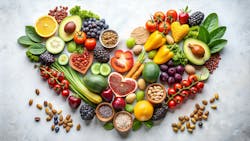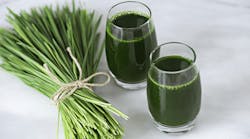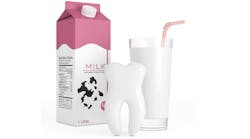Most people know that consuming sugary foods and beverages can contribute to poor oral health. Just as certain foods can increase the growth of bacteria, erode tooth enamel, and contribute to plaque production, other foods can slow the progression of these conditions. These healthy foods can contribute to improved tooth growth, minimization of bacterial accumulation, plaque removal, and other benefits to oral health. By incorporating these foods and beverages in moderation as part of a healthy diet, people can reduce their risk for cavities, gum disease, and other oral health concerns.
Garlic
Although garlic is commonly blamed as a cause of bad breath, the allium offers a number of antibacterial properties. When people chew a piece of garlic, the crushed clove releases enzymes that convert into allicin. Allicin acts as an antibacterial agent, but the benefits depend on the way that the garlic is processed. For oral health, garlic may need to be chewed directly to get these benefits. Regular eating of whole garlic cloves may help remove harmful bacteria that can cause gum disease or tooth decay.
Dairy products
People typically associate calcium in dairy products with strong bones—teeth in particular—but the full picture is more complicated. Milk, yogurt, and cheese offer excellent oral health benefits in a variety of ways:
- Presence of lactose, which is a sugar with a lower incidence of cavity-causing properties
- Necessary components for bone growth and maintenance, including calcium and phosphate
- Antibacterial peptides for preventing bacterial growth
A 2023 review revealed that plant-based milks and milk products do not offer the same kinds of benefits.1 Specifically, they are more likely to contain cavity-causing carbohydrates, and they also lack the minerals and beneficial peptides associated with greater tooth strength.
Green tea
Green tea has traditionally been consumed to maintain overall health. Although green tea’s benefits for oral health have been discovered more recently, it is becoming a popular option with few disadvantages. According to a 2021 review, green tea contains antioxidants and polyphenols, which are associated with improved health.2 For oral health in particular, the epigallocatechin gallate in green tea inhibits the production of bacteria known to cause gingivitis and periodontitis. The tea also helps to decrease inflammation, which can reduce some of the painful effects of gum disease.
Green, leafy vegetables
Green, leafy vegetables such as spinach offer plenty of health benefits. The leaves are high in key nutrients such as vitamin A, folic acid, calcium, and vitamin C.3 A 2024 study revealed that dietary nitrate, a common component of spinach, reduces saliva’s acidity after consuming a sugary beverage.4 Nitrates can also minimize inflammation. These studies indicate that people might need to consume these foods in larger quantities, such as a liquid or a dried powder, to gain these benefits. As such, consumers who are looking to minimize their risk of gum disease could use these vegetables in various forms to help them prevent the symptoms of the most common conditions.
Celery
Much of oral health involves the prevention of bacterial accumulation, in which the consumption of celery can assist. Staphylococcus aureus is a bacterium with a high level of antibiotic resistance. Although mouthwash might seem like the most obvious choice to get rid of S. aureus, it can have side effects. A 2023 study demonstrated that the application of celery leaf extract was able to significantly reduce the incidence of this bacteria.5 Additionally, some studies show that celery has antioxidant and antifungal effects, important for organ and overall health.6
Almonds
Almonds offer a variety of health benefits, including oral health. Relatively low in sugar with higher quantities of protein and nutrients, almonds help to satiate the body. The high calcium and zinc content of almonds contribute to healthy tooth growth.7 Low zinc levels are associated with a higher risk of infections and bone degeneration, which could be improved by eating almonds. Almonds also help to stabilize blood glucose,8 which can minimize the likelihood of people searching for a sweet treat that might lead to cavities.
Apples
Although they do not necessarily prevent cavities, eating apples poses interesting opportunities for the prevention of periodontal disease. A 2015 letter to an industry journal noted that apple farm workers had a notably lower rate of pocket depth, a common sign of periodontal disease.9 A chewy, fibrous fruit, apples can help to remove plaque on the teeth to some degree. More recent studies indicate, however, that people should still brush their teeth after consuming apples.10 Regular oral hygiene, along with twice-yearly visits to a dentist, can help ensure people have the tools they need to maintain great oral health.
Improving oral health calls for expert attention from a dentist, although diet can make a big difference. People may not know which foods can give them the best chance of preventing cavities or minimizing the effects of gum disease. In fact, eating foods that are high in nutrients and low in sugar or acid can provide these benefits. By adding these items to a varied diet, consumers can enjoy better oral health over a longer period of time.
Editor’s note: This article originally appeared in Perio-Implant Advisory, a chairside resource for dentists and hygienists that focuses on periodontal- and implant-related issues. Read more articles and subscribe to the newsletter.
References
- Shkembi B, Huppertz T. Impact of dairy products and plant-based alternatives on dental health: food matrix effects. Nutrients. 2023;15(6):1469. doi:10.3390/nu15061469
- Vyas T, Nagi R, Bhatia A, Bains SK. Therapeutic effects of green tea as an antioxidant on oral health– a review. J Family Med Prim Care. 2021;10(11):3998-4001. doi:10.4103/jfmpc.jfmpc_943_21
- Waseem M, Akhtar S, Manzoor MF, et al. Nutritional characterization and food value addition properties of dehydrated spinach powder. Food Sci Nutr. 2021;9(2):1213-1221. doi:10.1002/fsn3.2110
- Alhulaefi SS, Watson AW, Ramsay SE, et al. Effects of dietary nitrate supplementation on oral health and associated markers of systemic health: a systematic review. Crit Rev Food Sci Nutr. 2024;11:1-16. doi:10.1080/10408398.2024.2351168
- Milleningrum FL, Gunadi A, Arina YM. Antibacterial effect of celery leaf extract (Apium graveolens L) against Staphylococcus aureus in vitro. Int J Applied Dent Sci. 2023;9(2):171-174. doi:10.22271/oral.2023.v9.i2c.1725
- Kooti W, Daraei N. A review of the antioxidant activity of celery (Apium graveolens L). J Evid Based Complementary Altern Med. 2017;22(4):1029-1034. doi:10.1177/2156587217717415
- Uwitonze AM, Ojeh N, Murererehe J, Atfi A, Razzaque MS. Zinc adequacy is essential for the maintenance of optimal oral health. Nutrients. 2020;12(4):949. doi:10.3390/nu12040949
- Gulati S, Misra A, Tiwari R, et al. Beneficial effects of premeal almond load on glucose profile on oral glucose tolerance and continuous glucose monitoring: randomized crossover trials in Asian Indians with prediabetes. Eur J Clin Nutr. 2023;77(5):586-595. doi:10.1038/s41430-023-01263-1
- Manchanda M, Sampath N, Fotedar S, Sarkar ADE. The amazing periodontal health benefits of apples. European J Gen Dent. 2015;4(1):29-30. doi:10.4103/2278-9626.149688
- Rubido S, García-Caballero L, Abeleira MT, Limeres J, García M, Diz P. Effect of chewing an apple on dental plaque removal and on salivary bacterial viability. PLoS One. 2018;13(7):e0199812. doi:10.1371/journal.pone.0199812
About the Author
Jeena E. Devasia, DDS
Jeena E. Devasia, DDS, earned her Bachelor of Science degree from Virginia Commonwealth University with the distinction of summa cum laude. She has participated in multiple Mission of Mercy projects and is a dentist at McLean DDS.


